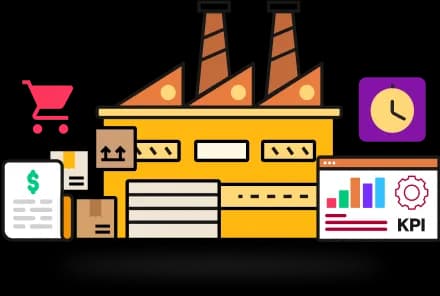Industry
Industrial Manufacturing
High Tech & Electronics
Footwear Manufacturing
Apparel & Textiles
Food & Beverage
Rubber & Plastics
Metal Fabrication
Industrial Machinery & Equipment
Construction & Engineering
Furnitures & Fixtures
Medical Device Manufacturing
Automotive Manufacturing
Aerospace And Defence
Screw Shop Manufacturing
Spring Shop Manufacturing
Solutions
Pricing
Resources
Company
GST Legacy
GST: The Indian logistic industry now and then
The logistic industry is a major support to the Indian economy contributing 4.7% to the GDP. The value of this industry is $130 billion and sadly one of the most unorganized sectors in the country. It comprises commercialized movement of goods from one state to another or within one state to fulfill the needs of the people. Every nooks and corner of India depend on this industry for all needs right from basic food supply to big manufacturing machinery. This article will discuss how GST is changing this big unorganized sector in India.
The Indian Logistic Industry before GST
It is important to give a glimpse about the pre-GST logistic scenario in India to understand the post-GST framework. The logistic industry comprises inbound, outbound manufacturing segments and the supply chain in India. The various segments of this industry are value added logistic, freight forwarding, warehousing, transportation which is further divided into rail, road, air and water. For various serious issues, the logistic cost in India was higher than many countries. One of these issues was complex tax structure; there were five taxes, namely Excise Duty, Service Tax, Sales Tax/VAT/CST, Customs Duty and Entry Tax/Entertainment Tax. Moreover, any freight that moved in 29 Indian states was taxed multiple times as per various geographical locations.
Similarly, dishonest practices like bribery and corruptions made the industry handicapped in terms of long delivery time, fulfilling vested interest of various self-created groups and regional strikes due to social or political insurgencies.
The Indian Logistic Industry after GST
GST is going to create a bigger impact on the logistic industry of India in the following fields:
Burden of interstate tax
Earlier, the pre GST complex tax structure was a big burden for the transporters as they were asked to pay indirect taxes at different rates in all the 29 states of India. Apart from this, 2% corporate tax was levied in any inter-state good transfer. But GST has brought a unified tax structure across all the states irrespective of any geographical differences. Thus, comparatively, the previous tax burden has decreased to a large extent.
Moving towards an organized sector
GST is inspiring the large market players to emerge and control the complete supply chain. This new tax structure is discouraging the small and medium market players but at the same time transforming the logistic sector to an organized structure.
A faster logistic time
Due to the complicated indirect tax structure, the trucks were delayed in reaching their destinations on time before GST’s implementation. But the uniform tax structure of GST has decreased the transportation time. The burden of border check posts is no more a headache for the transporters. This is increasing the operational efficiency of the industry along with fast deliveries and low logistic cost. The World Bank stated that India can save upto 30-40% logistic cost by eliminating the tolls and check posts.
The warehousing pattern will change
A centralized warehousing and an integrated tax system is making the messy supply chain simpler than before. The warehouse optimization system is minimizing the inventory as well as logistic cost. It is expected to minimize this logistic cost by 1.5-2.00%.
Developing forward
The GST tax rate is for air freight (export), warehousing and e-commerce are 18% whereas the pre-GST indirect slab was 15%. 5% GST slab is decided for road transportation and ocean freight services. The government has introduced an e-way bill for smooth truck movement and this bill will be implemented from October 2017. The business players are changing their supply chain strategies in compliance with GST. For an unorganized sector like logistic, lots of hand holding are required to understand the gap between the compliance need and operations. A least minimum six month is an ideal time for the industry to move on to a completely new tax structure like GST.
Get Started with Deskera
Benefits of cloud business software
- Productivity
- Implementation
- Mobility
- Scalability
- Security
See related articles about India GST
What our Customers Say About Us
Whatever your business
size, Deskera enables you to
simplify operations across
business functions. Here's
what our customers say
about us.


At GoDo, we understand that managing our finances and customer relationships is essential for our success. Deskera has provided us with an easy to use and intuitive platform that has enabled us to access our financial data, track customer relationships, and manage our finances with ease. We have been able to streamline our processes, better manage our finances, and stay on top of our customer relationships. We highly recommend Deskera to any business that is looking to stay organized and efficient.
Wesley Wright
CEO, GoDo Life


We are extremely pleased with our decision to switch to Deskera and have seen a significant improvement in our business operations since making the switch. The sales process was smooth from start to finish and customer support at every step of the implementation was stellar. Highly recommend Deskera to those looking for a great ERP solution.
Wally Mears
CEO, The Jungle

We implemented Deskera's integrated platform to improve our procurement and inventory management processes to streamline our operations and improve efficiencies. I highly recommend their platform to any company looking to accelerate their growth.
Scott Phetsalod
Laboratory Manager
Run Your Business With Deskera

Products
Use Cases
 , India
, India  , Singapore
, Singapore  , and Canada
, and Canada  with
with 


